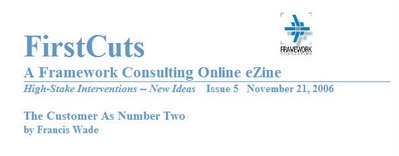 FirstCuts
FirstCuts
A Framework Consulting Online eZine
High-Stake Interventions — New Ideas Issue 4 October 21, 2006
Transforming an Airline
by Francis Wade
Editorial
This past week I attended small parts of the Human Resource Management Association of Barbados’ annual conference in Bridgetown. I had an opportunity to reflect on how lucky I am to be a Caribbean professional — one who travels and works across a region that I am proud to be a part of.
This contrasts with the time spent living in the U.S.A. when I could never shake the feeling of being a stranger in a country I was unable to care deeply about.
I am thankful to be home, and I consider each territory in our region to be a part of my extended home, and each business to be one that is an economic extension of my own.
In this sense, my comments on BWIA in this issue are spoken as an extended owner,and while the airline’s seemingly rough landings make me very nervous each time around, I think of them as our landings, by our airline, owned by our people.
Francis
Transforming an Airline
I flew BWIA West Indies Airways last week and had some time to think about its upcoming demise.
BWIA, the official carrier of Trinidad and Tobago, is officially going out of business on Dec. 31, 2006. It will be replaced by Caribbean Airlines, which apparently will take over much of the equipment, personnel and routes of today’s BWIA.
At the same time, there have been announcements in the press about the possibility of an upcoming merger between the airlines of LIAT and Caribbean Star. The coincidence is that both of these activities are taking place in the same industry, at the same time. As a past customer of all three companies, I read the pronouncements in the press while thinking that not much would change.
As I sat in my seat on a recent BWIA flight wondering where my lack of confidence was coming from, I happened to lower the tray-table and registered a familiar sense of annoyance with a “steupps” of the teeth. As usual, the back of the pink, leatherette seat in coach class was defaced with graffiti and pen marks.
Just as you would expect, given that most people are right-handed, more of the blue and black mess is on the right than the left. The marks look accidental for the most part, but now and then there is evidence of a malicious adult and mischievous child leaving their “mark” on purpose with a note that they “….wuz ‘ere.”
A pet peeve of mine is that somewhere, someplace, someone decided to pick these particular seats. The problem with them is not that they are ugly, but that they are perfect for writing on. The result is graffiti… hidden behind the tray-table, on the back of every seat.
 I cannot say how all this came about — who decided on
I cannot say how all this came about — who decided on
the colour scheme, or the choice of fabric. How is it that the
seats could not be reliably cleaned? Why couldn’t someone install some kind of cover?
And why should I think that this particular annoyance will not
be repeated in the new Caribbean Airlines?
I am no expert on the airline industry, but I can predict that
whatever organizational culture allowed messy seats to be the norm, is likely to be continued in the new company. After all, the CEO will be the same, and the vast majority of the new airline’s staff will be drawn from BWIA.
I asked myself, if I had a blue-print for creating the new airline, what would it look like? I came up with three simple, but uncommon steps that I think would apply to Caribbean Airlines as well as to the possible LIAT/Caribbean Star merger.
The airlines should focus on embracing, rather than denying, their history of failure, co-creating the future with their employees and making bold requests for action and sacrifice.
********* Step 1: Embrace the History of Failure
The tendency of most organizations in a transition such as this one is to try to fast forward work to define the new company, in an attempt to quickly put some distance between the new and the old dispensations. The website announcement of the new airline bears this out. There is no mention of the reason why BWIA is closing; the announcement speaks only to how lucky the
new airline is to inherit the fine safety record of the soon to be defunct airline.
Unfortunately, any kind of transformation program gets its strongest start from doing the exact opposite. Instead of ignoring the past, the first step to a deep transformation is to embrace the historical reality fully and completely.
One way to do this would be to engage all the employees in an exercise to bring closure to the company’s past. This exercise would have to encompass both the positive and negative aspects of the company’s performance to date.
The truth is, in spite of best efforts, BWIA was a financial failure. At the same time, many good things happened for the thousands that were employed and their families in its sixty-plus year history. In Step 1, this mix of positive and negative results would have an opportunity to be fully aired and expressed.
Practically, this could be done in BWIA in a series of meetings, primarily devoted to exploring the past in order to tell the truth about it. There would be no effort to try to change anything at this point. Instead, the positive end-result would be that people’s aspirations and hopes would have a chance of being put to bed, and their disappointments would have an opportunity of being addressed.
I imagine employees saying “Thank You,” “I am sorry this did not work out” and “Goodbye. “
For the typical results-driven, Type A executive, especially, this can all be very difficult medicine to swallow.
“Embracing the history of failure” looks an awful lot to them like slowing things down, and avoiding the job that needs to be done. They might well argue that people should be able to move on, and just forget about the history. Or they might say that such an exercise should be delayed until the new company is launched.
However, it is quite normal for a CEO to be able to mentally and psychologically make a shift that their staff cannot.
The staff of the new airline will have 550 employees, compared with the 1800 that BWIA had. The vast majority of them will come from the old company.
The fact that they would have been selected, and their colleagues left without jobs, provide perfect conditions for survivor guilt, the debilitating emotion that affects employees in situations like this. Research has shown that employees experiencing this phenomenon can experience productivity decreases by as much as 50% for months at a time.
Doing the exercise inside BWIA, rather than Caribbean Airlines, could leave everyone satisfied that they have done their best to take care of all their colleagues, while preparing all the ex-BWIA employees for whatever is next in their careers — Caribbean Airlines or not.
I imagine that the transition team is currently focusing on the “hard” aspects of the business — those that are measurable and tangible. If executives could stop the frenetic 24/7 activity that is no doubt underway, it would help build a strong foundation for the new airline to build on.
From my work with regional executives who have lead such transitions, their message is a singular one: the “soft” aspects of your transition are more important than you think.
********* Step 2: Co-Create the Future
Once employees experience closure, it takes only a nano-second before they feel the creative impulse to create anew. A smart company will capitalize on this energy and meet this impulse with an opportunity to co-create.
From my experience, it does not matter what exactly gets created, whether it be a statement of values, vision, strategy, a business plan or even a new company logo.
The actual creative activity is irrelevant.
What is important is that the activity be authentic. It must be vital to the well-being of the company. It cannot be merely “symbolic.”
It is equally important that everyone has a chance to be heard, to contribute, and to see how their contribution might be included in the final result.
I have seen very few companies in the region put themselves through this process, and do it well. I put this down to a paucity of methods, and an unwillingness to risk the activity going badly on a public scale, rather than a lack of awareness of the need.
********** Step 3: Call to Action and Sacrifice
This might be the hardest step of all.
CEOs and Managing Directors in our region have come to believe that a key part of their job is to shield their employees from bad news. This paternalistic relationship is one that is actively encouraged or passively allowed by both employees and managers.
However, paternalism is the very opposite of the responsible, adult-like give and take that marks healthy companies. Without this kind of relationship, it is impossible for companies like BWIA to make the changes it needs to make.
Obviously, if Caribbean Airlines conducts “business as usual,” it will result in more of the same failures.
What most leaders fail to realize is that when their employees are working with them to co-create a future, they are ready, willing and able to make the changes necessary to bring it
about. When the requests made of employees are bold, and big, it can help to demonstrate that the days of paternalism are over, and that progress will only come from cooperation.
In fact, it is widely believed that BWIA’s demise had more to do with a lack of cooperation than anything else. The inability of the management and unions to work together to save the company was seen by the owners as the final straw.
This third step is not optional.
If this step is not taken, a dangerous vacuum gets created. In response, employees in our region retreat even further into a paternalistic mindset, waiting for management to “tell them
what to do next.”
If it is taken, managers can make the case that the unusual circumstances involved, require everyone to find ways to change the way they do business. In the case of Caribbean Airlines, a critical mass of employees doing business in new ways is the only thing that will make a difference.
What will prevent dirty seats is not just new fabric. Instead, it will take a concentration of human energy to overcome this, and other hard-to-solve organizational problems. Ultimately, BWIA could not solve the problem of either clean seats or job-saving profits.
Starting off on the right foot might save Caribbean Airlines, and Caribbean Start/LIAT, from continuing the sad legacies of the past.
*
Next Steps
~~~~~~~~~~
To discuss this topic further, visit our company blog and follow the 6-part series of entries starting with:
http://tinyurl.com/yjr458
We promise to respond to comments and discussion added.
A white paper called “Equal Shmequal. It’s Never a Merger of Equals” written by a former employee, Amie Devero, can be found among our white papers at www.downloads.fwconsulting.com. This short but brilliant article applies to every merger I have ever witnessed.
Useful Stuff
Tips, Ads and Links
Framework’s One-Page Digest will be launched by the next issue. The Digest is intended as a short email with clickable links to some crucial resouces for Caribbean Executives, produced on a monthly basis.
Current Research Update: Study of Trinidadian Executives Working in Jamaica. We have begun to analyze the data collected, and are falling in love with what we are finding. An idea has come up that we should be looking to a second phase in which we include expatriates from other countries.
To manage this newsletter, we use an excellent programme called AWeber that you can explore here:- http://www.aweber.com/?213577
Subscriber Q&A
“I just read the 3rd issue of First Cuts and you continually amaze me with the pure honesty and outpouring of self into the things you write and put together. When I read most everything you write (including your blog) I feel like I’m talking with you rather than you talking to me and that’s the joy in it I think. It draws me in rather than tries to keep my attention focused on what is being said. And that’s a wonderful gift. Thank you.”
General and Newsletter Subscription Info
To contact us with feedback, questions or praise, email newsletter@fwconsulting.com
To subscribe, please email firstcuts@aweber.com from the email address that you which to be subscribed from
Please feel free to use excerpts from this newsletter as long as you give credit with a link to our page: www.fwconsulting.com
FirstCuts © Copyright 2006, Framework Consulting, except where indicated otherwise. All rights reserved worldwide. Reprint only with permission from copyright holder(s). All trademarks are property of their respective owners. All contents provided as is. No express or implied income claims made herein. Your business success is dependent on many factors, including your own abilities. Advertisers are solely responsible for ad content.
Contents
Editorial
Feature Article
Useful Stuff
* Tips, Ads and Links
* Subscriber Q&A and Feedback
* General and eZine Subscription Info
FirstCuts: An Online Newsletter From Framework Consulting Inc.
954-323-2552
876-880-8653
3389 Sheridan Street #434
Hollywood FL 33021, USA
 Here in the region, we delight in finding a “likkle man” who can do something at a fraction of the cost of a much bigger player, at the same perceived level of quality.
Here in the region, we delight in finding a “likkle man” who can do something at a fraction of the cost of a much bigger player, at the same perceived level of quality.









